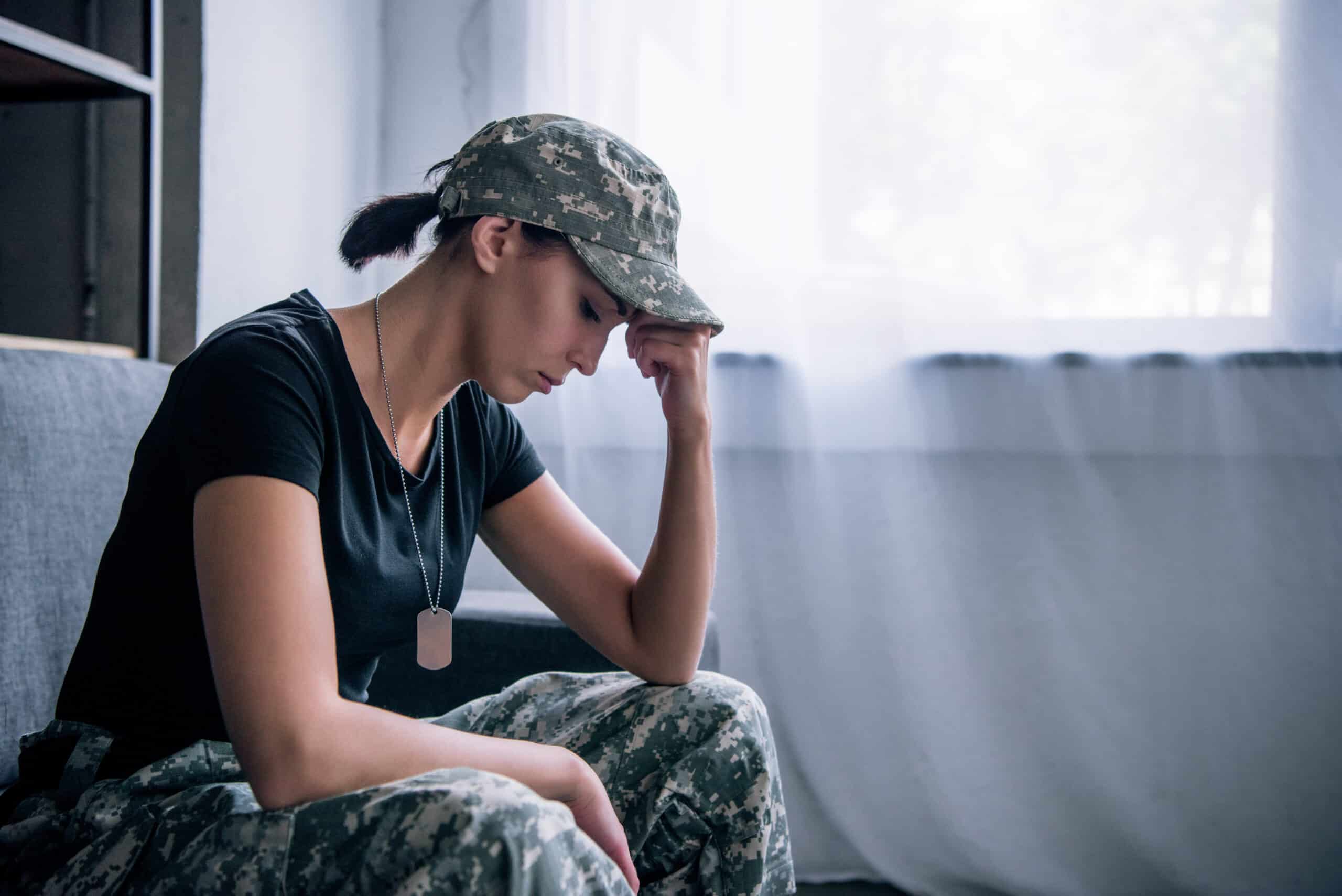Veterans and Anxiety
- Updated:

Anxiety is a prevalent mental health concern among veterans, often stemming from the unique and challenging experiences encountered during military service. According to a study analyzing data from a large, nationally representative sample of U.S. veterans, 7.9% of veterans screened positive for generalized anxiety disorder (GAD), and 22.1% screened positive for mild anxiety symptoms. At Acera Health, we understand the complexities of veteran anxiety and offer specialized treatment programs designed to address the specific needs of those who have served. Our residential inpatient treatment center provides a supportive and therapeutic environment where veterans can heal and reclaim their lives.
At Acera Health, we provide a holistic and integrative approach to treating veteran anxiety. Our comprehensive treatment includes personalized plans based on thorough assessments, evidence-based therapies such as Cognitive Behavioral Therapy (CBT) and Eye Movement Desensitization and Reprocessing (EMDR), and medication management. We also offer supportive group therapy, family involvement, and holistic therapies like mindfulness and yoga. Our dedicated staff is committed to creating a nurturing environment and providing long-term support through aftercare services. If you or a loved one is a veteran struggling with anxiety, Acera Health is here to help you achieve lasting recovery and renewed hope.
Understanding Veteran Anxiety
Veteran anxiety is a multifaceted condition that can arise from various factors, including combat exposure, traumatic events, and the stresses of transitioning back to civilian life. According to the U.S. National Science Foundation, about 11-20% of veterans experience PTSD in a given year. PTSD is characterized by intense anxiety, flashbacks, and nightmares related to traumatic events. Symptoms of PTSD can include intrusive memories, avoidance of reminders of the trauma, negative changes in thinking and mood, and changes in physical and emotional reactions, all of which are common veteran PTSD symptoms. In addition to PTSD, many veterans also struggle with veteran depression, which can significantly impact their overall mental health and exacerbate symptoms of anxiety.
Generalized Anxiety Disorder (GAD) is another common form of anxiety among veterans, involving excessive and uncontrollable worry about various aspects of life, often without a specific trigger. Symptoms of GAD include persistent worry, restlessness, fatigue, concentration issues, and muscle tension. Panic disorder is also prevalent, where veterans may experience sudden and intense episodes of fear, accompanied by physical symptoms such as rapid heartbeat, sweating, and shortness of breath. This condition can result in panic attacks and a constant fear of future attacks.
Social Anxiety Disorder is another manifestation of anxiety, particularly exacerbated by the challenges of transitioning to civilian life. Veterans with this disorder experience intense fear of social interactions, leading to avoidance of social situations and physical symptoms like blushing, sweating, and trembling. Understanding these different manifestations of anxiety is crucial for providing effective treatment tailored to each veteran’s unique experiences and needs.
Several factors contribute to veteran anxiety, including combat exposure, traumatic events, the transition to civilian life, and physical injuries. Combat exposure and witnessing life-threatening events can lead to lasting psychological trauma, while traumatic events like injury or the death of comrades can trigger anxiety disorders. The stress of adjusting to a non-military lifestyle can cause feelings of isolation and stress, and chronic pain or disabilities resulting from service can further contribute to anxiety.
Early recognition and intervention are crucial in managing anxiety among veterans. Effective treatment strategies include therapeutic approaches such as Cognitive Behavioral Therapy (CBT), Eye Movement Desensitization and Reprocessing (EMDR), and exposure therapy. Medication management can also be essential in controlling symptoms. Support systems like family therapy and peer support groups foster a supportive environment, while holistic therapies promote overall well-being, including mindfulness and yoga. Recognizing the signs and symptoms of these disorders helps in early intervention and appropriate therapeutic strategies, enhancing veterans’ overall quality of life.
The Impact of Anxiety on Veterans
Anxiety can significantly impact a veteran’s quality of life, affecting their relationships, job performance, and overall well-being. The consequences of untreated anxiety are far-reaching and can include:
- Relationship Strain: Anxiety often leads to misunderstandings and conflicts with loved ones. Veterans with anxiety may withdraw from social interactions, causing isolation and loneliness. According to a study by the RAND Corporation, veterans with PTSD and anxiety disorders are more likely to experience marital and family problems.
- Substance Abuse: Some veterans may turn to alcohol or drugs to cope with their anxiety, leading to substance abuse and addiction. About 20% of veterans with PTSD also suffer from substance use disorders.
- Employment Challenges: Anxiety can hinder a veteran’s ability to maintain steady employment. Veterans may struggle with concentration, memory, and stress management, contributing to job instability and financial difficulties. The Department of Veterans Affairs notes that veterans with severe anxiety or PTSD are at a higher risk of unemployment.
- Physical Health Issues: Chronic anxiety can result in significant physical health problems, including heart disease, hypertension, and weakened immune function. A study published in the Journal of Anxiety Disorders found that veterans with anxiety disorders have a higher prevalence of cardiovascular diseases compared to the general population.
Recognizing these impacts underscores the importance of seeking comprehensive and specialized treatment for veteran anxiety. Early intervention and tailored therapeutic approaches can help mitigate these consequences and improve veterans’ overall quality of life.
Comprehensive Treatment Approach at Acera Health
At Acera Health, we provide a holistic and integrative approach to treating veteran anxiety. Our residential inpatient treatment program is designed to offer a safe and nurturing environment where veterans can focus on their recovery. Our comprehensive treatment approach includes:
1. Personalized Treatment Plans
Every veteran’s experience with anxiety is unique, and so is their path to recovery. We develop personalized treatment plans addressing each veteran’s needs and goals. Our plans are based on thorough assessments and continuously adjusted to ensure optimal progress.
2. Evidence-Based Therapies
We utilize a range of evidence-based therapies that have proven effective in treating anxiety disorders among veterans. These include:
- Cognitive Behavioral Therapy (CBT): CBT helps veterans identify and change negative thought patterns and behaviors that contribute to their anxiety.
- Exposure Therapy: This therapy involves gradual and controlled exposure to anxiety-provoking situations to help veterans build coping skills and reduce their anxiety response.
- Eye Movement Desensitization and Reprocessing (EMDR): EMDR is particularly effective for treating PTSD by helping veterans process and integrate traumatic memories.
3. Medication Management
For some veterans, medication can be a valuable component of their treatment plan. Our experienced psychiatrists work closely with each veteran to determine the appropriate medication regimen, monitor its effectiveness, and make necessary adjustments.
4. Supportive Group Therapy
Group therapy provides veterans with a sense of community and shared understanding. These sessions offer a safe space for veterans to share their experiences, gain insights from others, and build supportive relationships. Group therapy can be particularly beneficial for reducing feelings of isolation and fostering a sense of belonging.
5. Family Involvement
Family support plays a crucial role in the recovery process. We offer family therapy sessions to help loved ones understand veteran anxiety and learn how to provide effective support. Strengthening family relationships can enhance the overall treatment experience and contribute to long-term recovery. Our family therapy sessions provide loved ones with the tools and knowledge on how to help a veteran with PTSD, fostering a supportive home environment.
6. Holistic Therapies
In addition to traditional therapies, we incorporate holistic approaches that address the mind, body, and spirit. These may include:
- Mindfulness and Meditation: These practices help veterans develop greater awareness and control over their anxiety.
- Yoga: Yoga promotes relaxation and physical well-being, complementing other therapeutic interventions.
- Art and Music Therapy: Creative therapies provide veterans with alternative ways to express their emotions and process their experiences.
7. Life Skills Training
Transitioning back to civilian life can be challenging for veterans. Our life skills training programs equip veterans with the tools to navigate everyday challenges and build a fulfilling life post-treatment. This includes vocational training, financial management, and stress management techniques.
Creating a Supportive Environment
At Acera Health, we are committed to creating a supportive and healing environment for veterans. Our facility is designed to provide comfort and safety, with amenities that promote relaxation and well-being. Our compassionate and dedicated staff are available around the clock to provide support and guidance, ensuring that veterans feel understood and cared for throughout their treatment journey.
Recovery from anxiety is an ongoing process, and we are dedicated to supporting veterans even after they complete our residential program. Our aftercare services include:
- Outpatient Therapy: Continued access to individual and group therapy sessions helps veterans maintain their progress and address emerging challenges.
- Alumni Programs: Our alumni programs offer ongoing support and connection with fellow veterans who have completed treatment, fostering a sense of community and shared resilience.
- Resource Referral: We provide referrals to community resources and support services that can assist veterans in their continued recovery and reintegration into civilian life.
Why Choose Acera Health?
Choosing the right treatment center is a critical decision for veterans seeking help with anxiety. Acera Health stands out for several reasons:
- Veteran-Focused Care: We have extensive experience working with veterans and understand their unique challenges.
- Comprehensive Treatment: Our holistic approach addresses all aspects of veteran anxiety, ensuring a well-rounded and effective treatment experience.
- Experienced Team: Our multidisciplinary team includes therapists, psychiatrists, and support staff dedicated to providing the highest level of care.
- Supportive Environment: We offer a nurturing and compassionate environment where veterans can heal and grow.
Take the First Step Toward Recovery
Anxiety among veterans is a serious concern that requires specialized care and attention. If you or a loved one is a veteran struggling with anxiety, seeking help is a crucial step toward improving mental health and overall well-being. At Acera Health, we offer a specialized residential inpatient treatment program specifically designed to address the unique challenges faced by veterans with anxiety.
Our comprehensive care includes evidence-based therapies, personalized treatment plans, medication management, and holistic approaches to ensure a well-rounded recovery process. Our dedicated team of mental health professionals provides a supportive and therapeutic environment where veterans can heal and develop coping strategies to manage anxiety effectively. Recognizing the importance of family involvement and community support, we offer family therapy sessions and aftercare programs to help veterans maintain their progress post-treatment. Contact Acera Health today to learn more about our program and take the first step toward recovery. By addressing veteran anxiety with the right support and resources, we can help build a brighter future for those who have served.
Clinically Reviewed by:

Melody Stone, LMFT
Melody Stone is a Licensed Marriage and Family Therapist who has over 17 years of experience in the field of behavioral health. She works as the Chief Clincal Officer (CCO) to Acera Health, where she is a strong leader focused on sustainable success.
Related Resources

PTSD Symptoms in Veterans
PTSD Symptoms in Veterans Reviewed by: Melody Stone Post-traumatic stress disorder (PTSD) is a prevalent mental health condition that significantly affects many veterans who have

How to Help a Veteran with PTSD
How to Help a Veteran with PTSD Reviewed by: Melody Stone Helping a veteran with PTSD is essential as they navigate life after deployment. Statistics

Understanding Suicide & Veterans: Why Do Veterans Commit Suicide?
Understanding Suicide & Veterans Reviewed by: Melody Stone In addressing the complexities of suicide among veterans, it’s essential to recognize the interplay of various factors.

Veteran Program
Veteran Mental Health Treatment in Orange County The Path to Sound Mind, Body and Soul Orange County Luxury Residential Mental Health Facilities Call Now Verify




